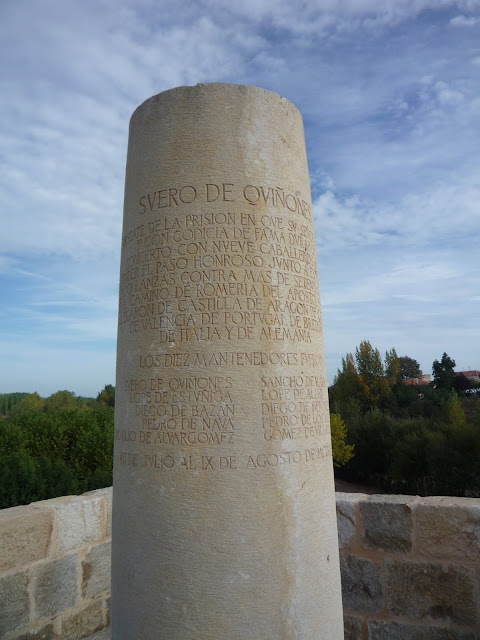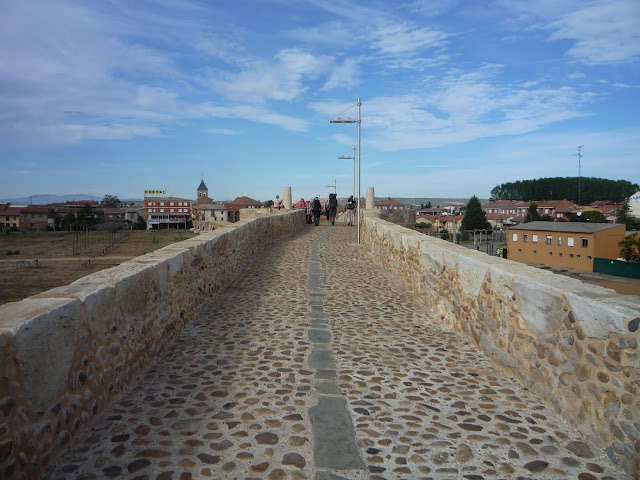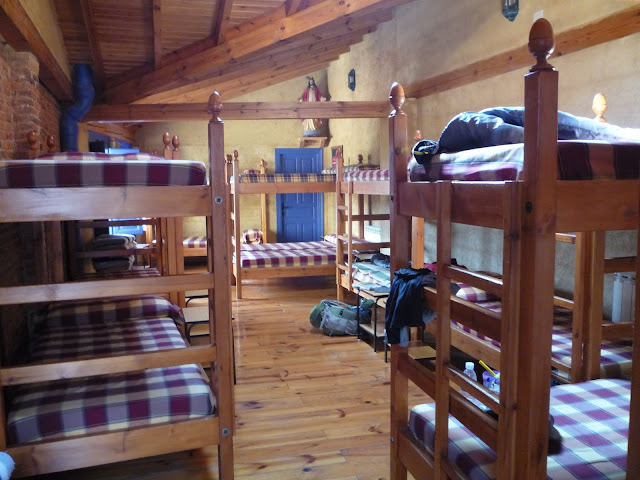Most of the morning walk was solitary, I relished the ability to enjoy
the pleasant dawn temperatures and pray a rosary (or five). Shortly before the first café at Villavante,
a tiny and empty town of low stone buildings, vacant streets, and cobblestone roads
veering off in confusing directions, I hear someone coming up behind me and
turn to see Vittoria – the yoga-practicing Swiss girl with long red hair and a
lip piercing.
We’re the only pilgrims in sight, so we fall into that easy early
morning conversation, the obligatory litany of questions you ask someone on the
Way: How far are you going to day, how are you feeling, where did you stay last
night, etc, etc, etc. We decide to duck
into the corner café in Villavante.
The café looks, for all intents and purposes, like a dive bar
transplanted from Jackson, Mississippi to the middle of Spain. Everything, including the bartender, is
slightly dusty and in need of a good scrubbing down with bleach. There are flies circling around the door as
we walk in; the counter leaves some sticky residue on my elbows when I order a
coffee for myself and tea for Vittoria.
When I turn to go join her at the window table, she’s got a look of amused
wariness, sitting in lotus position on the chair, massaging her feet. I sat the drinks down and went in search of
the bathroom.
Have you ever seen Trainspotting? If so, you really don’t need any more
description of the bathroom, but for those of you who haven’t, it looked
something like this: There is a bare,
weak light bulb hanging from exposed wiring above the toilet, which looks as if
the seat has been ripped off violently (I’m guessing in a fight over Real
Madrid vs. Barcelona). I’m happy I cannot
see into the darker corners, and I swear I hear movement. There is no toilet paper, and the bowl has
been neither flushed nor cleaned in recent memory - a dark ring is barely
visible through muddy water. I don’t
want to urinate here, but it’s that or nothing, so the deed is done.
Shaking off my disgust, I walk back out into the café and sit down,
reaching for hand sanitizer (oh, forget about a sink. There wasn’t one.), and Vittoria gets up to
also hit the bathroom. I think about
saying something, and choose to not.
I’m sipping my coffee with my head down a couple of minutes later when,
coming back to the table, she punches me hard in the shoulder and lets out a
string of angry… German? Swiss? What do they speak in Switzerland? Anyway, it sounds angry and my shoulder
hurts, but I can see she’s smiling when she plops down in front of me, rattling
my coffee cup. Our common languages
aren’t strong enough to go into detail, but between us we start to snicker and
laugh about the Nastiest Bathroom in Spain.
For a moment I’m worried about offending the bartender, but the old
woman disappeared into a backroom to loudly light a cigarette and cough, and
hasn’t been seen since.
As we're sitting there, Tom the Hungarian Documentarian comes bustling in with his lady and sit down next to us. They look massively disheveled and dirty, and I was certain they had passed me by a few days before. Obviously I was wrong, and happily wrong, glad to see Tom and chat him up while his lady heads in the direction of the bathroom. She comes back shortly, looking traumatized. I try to manage the introductions between them and Vittoria as best I can; Tom flicks on the video camera and films us for a few minutes while we're talking.
It's strange to know that there are clips, somewhere in the world, of myself and the people I was around on pilgrimage - video and pictures that exist that would show something different than what I remember of my time in Spain. I'd like to see them, but I never got Tom's contact info. But I know, it's out there, somewhere, maybe waiting to be found.
When we get up to pay and go, leaning against the bar and coughing
loudly to get the woman’s attention, I feel Vittoria hip bump me and see her
cock her jaw in the direction of something on the wall. There above the orange juice machine is a
calendar showing a completely naked woman.
Not pinup naked, mind you, but something you might see in the pages of Hustler.
It’s enough to put me into a full-on fit of giggles, and despite my
embarrassment I have to more or less just throw my euros at the woman and
go.
Over the next couple of hours into Hospital de Orbigo, Vittoria and I
manage to work our way through a few basic conversations – mostly vague
appreciations of the landscape and sharing what food we had in our packs. When we come around several outlying
buildings to approach the town’s famous medieval bridge, she starts asking me
questions about it in a pidgin of English, Spanish, and German. Stopping to take pictures, I try to show her
my guidebook and tell her that the bridge was the site where a famous knight
took on 300 challengers and won, restoring his honor before continuing on
pilgrimage to Santiago. The story helped
inspire Don Quixote, and there is a helpful marker that tells the story:
It’s also much, much larger than I expected – stretching full across my
few and involving a substantial walk to get across it and into the town
proper. I more less convey the knight’s
story to Vittoria, and she responds by bursting into a full on gallop across
the bridge, pack and all, playing at being a knight jousting, as we walk down
into the town. It’s a beautiful moment,
rendered in slow motion, as the midday sun leaves everything in bright happy
hues and this girl, laughing, gallops in front of me between the elderly town
residents. She’s wearing aviators and her
smile is huge, there is a glint of sunlight off her lip ring, and I couldn’t
have been happier.
The path takes us right past the church, tolling its’ bells for midday
mass above huge, open wooden doors. The
central square opens up to the left, and we join some other pilgrims strung out
along the stone benches lining the street, drop our packs, and go wandering to
look for a supermarket or bakery to buy food.
The supermarket around the corner is cramped in space, tight with
pilgrims, and the owner bustles around rearranging things with little care for
us as try to browse, but when we decide to split an apple tart she smiles and
hacks off the largest ‘piece’ I’ve ever seen.
It may have well been an entire pie, and Vittoria’s eyes stretch wide
when the woman hands it to her in wax paper.
I rethink the package of cookies I’d put on the counter, pay the lady,
and we go back outside to the sunlight.
I’m at a loss on how to split the tart, the apples, and the cheese we
bought until Vittoria snaps out a knife and starts cutting. I loved watching her carefully cut the apples
into slices and split the cheese into chunks – it’s something that always
fascinates me, watching other people work with their hands. It really doesn’t matter what they’re doing,
I just like watching people work. It
gives me a feeling of intimacy or quietude, like what this person is working on
is the most important thing in the world.
While we are eating, a woman pilgrim pulls up on a bike and stops short
of our crowd by fifteen feet or so, and readies her own lunch. I’ve seen her somewhere on the Way before,
and I remember that she doesn’t speak English.
Maybe she’s from Eastern Europe, or Germany, and although I try to
gesture that she should join us despite the language barrier, she stays
put. This interaction – the sleek bike
pilgrim keeping distant, albeit cordially, from our host of messy hikers – has become
typical of the cultural divide that separated us along the Camino. It’s a shame, on many levels.
After lunch the entire crowd packs up and makes to head on, and I fully
expect to see them again up the road.
Stefano, the gushing Italian who’d given the American girls such a hard
time about their pasta in Castrojeriz; Kim of Texas and the Imitation of Christ; Vittoria and others
– but I never did. There’s sadness in
that, I think, but also a certain rightness.
Despite the laughter and atmosphere they brought with them, I felt older
and more serious around them, especially when talking about why we were each on
pilgrimage. I wanted to feel older, I
wanted to take it more seriously, so it’s not a regret. But there is definitely some melancholy in
the knowledge that your life runs on a tract that is mostly parallel, and
intersects but rarely with, such bright and shining people.
Hospital de Orbigo once again offers a choice of two albergues opposite
one another: municipal right and private left.
When I walk into the private one I know that’s where I’m going to stay
immediately. The building, a converted
house, is constructed from warm woods and bright tiles, and there is an easel
set up with painting supplies in the foyer, where pilgrims can paint whatever
they want. The result is that the walls
are covered, upward to the skylights on the third story, in framed paintings of
surprising quality. There are straightforward
renderings of the bridge at sunrise and sunset, images of pilgrims in
silhouette against the Meseta, abstract symbols and bright colors, and not a
few portraits of pilgrims that are shockingly advanced. I want to take several of them home,
particularly one of the silhouettes – the pilgrims are in sharp relief against
a bright blue and orange sunset. It’s
not expertly done, but it rings so strongly of many of my own photos of the
Camino I want it for my wall at home.
The hostel is empty and the owner lets me know that I can pick any of
the beds (beautiful bunk beds upstairs with actual plaid sheets and pillows, no
less) and that, so far, I only have one other pilgrim with whom to split the
room. I drop by stuff and go walking
back out to a restaurant next to the bridge with a large open balcony, intent
on reading and watching pilgrims come shuffling into town.
The bartender at Don Suero de Quinones convinces me to have a beer
instead of coffee (He asks, “Do you want a beer?”) and I take the pint outside
and prop my feet up, happy to enjoy a light day and plenty of time left to
relax. Sure enough, many pilgrims come
walking past but few stop, and I only vaguely recognize some of them so my
reading time is largely my own.
Heading back midafternoon for a nap at the hostel, I find out my
roommate is the Italian woman, Jessica.
She’d actually laid over in Hospital to give her feet a rest, and I run
into her in the backyard open courtyard dressing her feet.
She has the worst blisters I’ve ever seen in person – cracked and yellow
and pus-filled. There are great sheets
of skin hanging loosely from her heels and the pads of her feet, like Freddy
Kreuger’s been hard at work. Her feet
look like an example from a medical text, but as I sit down across from her and
start talking, she busies herself with her feet without reservation or obvious
disgust. I’m amazed that she can go
through this process without reaction – there’s debriding to be done, draining,
cutting away dead skin, rinsing and washing, applying tonic, and rebandaging
each toe individually. It takes forever,
and in the meantime I find out that she is from southern Italy and teaches
sailing. That explains her tan, which is
deep, beautifully toned, and clearly not from a box or a bed.
We are shortly interrupted by the hostel owner’s family taking over the
kitchen area and preparing some meal that smells incredible. They are loud, jovial, and bright with
laughter, even the older man and woman I assume are the grandparents. Jessica and I keep quiet on the patio,
enjoying the sunshine, until I’m startled by the mother coming out to shove hot
bowls of stew in each of our hands. I
tried to refuse out of politeness, but the woman only waves me off, goes back
into the kitchen, and returns with a hunk of bread she drops in my lap.
The stew is thick and delicious.
It’s some sort of tomato-based gumbo, heavy on the chorizo and
carrots. And holy crap is it hot – I do
that thing where I fail to recognize my impending danger and promptly burn the
devil out of my tongue with the first bite.
Jessica finds this funny.
The rest of the evening we spend in much the same fashion, shifting from
the outside patio to the large farm table in the kitchen as the family cleans up
and disperses. A few pilgrims come
wandering in and most wander back out again, obviously in search of a
restaurant with a pilgrim menu and drinks.
In the early evening, Jessica and I are joined by a Czech-turned-Irish
guy named Csube (pronounced ‘Chubby’, according to him) who easily falls into
our halting conversation. Jessica makes
tea and convinces me to have some as well…
Wait. Stop for a second. My historical resistance to, and suspicion
of, tea is legendary. I can count the
times I’ve enjoyed a cup of tea on the fingers of one hand, and given the
choice I’ll always prefer coffee. Maybe
it’s the offering, or the easiness and relaxation of the afternoon, maybe I’m
just too lazy to go get a coffee, but I say yes.
And damn if it isn’t one fine cup of tea. All three of us are sitting there, kicked
back, cupping our teas with our hands, happy and content, when the hospitalero
walks through. He sees the tea, chuckles
in that grandfather-with-the-children manner, and points to a sign above the
shelf where Jessica found the tea bags:
“This shelf for hospitalero only.”
Oops. But before I can even get
the ‘Lo siento Senor!’ out of my mouth, he’s waved us off with a ‘De nada’ and
clicked the shelf radio onto a station playing bluegrass. If it could get any more welcoming and
home-like, I don’t see how.
And this is how the night ends: Csube makes entirely too much chicken
soup for himself and forces the rest onto Jessica and myself. We drift in and out of short conversations
around the table, in between busying ourselves with our guidebooks, journals,
and novels. There is a gorgeous mural of
the Last Supper above us on the kitchen wall, and as the night winds down and
we head upstairs to go to bed, I’m grateful for my temporary family – pilgrims and
hospitaleros alike – and the ability to feel at home even here, even now.







No comments:
Post a Comment